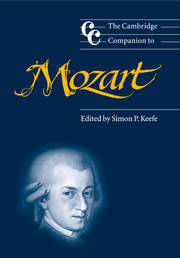Book contents
- Frontmatter
- Introduction
- Part I Mozart in context
- Part II The works
- 5 The keyboard music
- 6 The concertos in aesthetic and stylistic context
- 7 The orchestral music
- 8 Mozart's chamber music
- 9 Mozart as a vocal composer
- 10 The opere buffe
- 11 Mozart and opera seria
- 12 Mozart's German operas
- Part III Reception
- Part IV Performance
- Notes
- Selected further reading
- General index
- Index of Mozart’s works
6 - The concertos in aesthetic and stylistic context
from Part II - The works
Published online by Cambridge University Press: 28 September 2011
- Frontmatter
- Introduction
- Part I Mozart in context
- Part II The works
- 5 The keyboard music
- 6 The concertos in aesthetic and stylistic context
- 7 The orchestral music
- 8 Mozart's chamber music
- 9 Mozart as a vocal composer
- 10 The opere buffe
- 11 Mozart and opera seria
- 12 Mozart's German operas
- Part III Reception
- Part IV Performance
- Notes
- Selected further reading
- General index
- Index of Mozart’s works
Summary
Writing in haste to his father, Leopold, shortly before a musical soirée on 28 December 1782, Mozart described three new piano concertos he was composing, K.413 in F major, K.414 in A major and K.415 in C major:
These concertos are a happy medium between what is too easy and too difficult; they are very brilliant, pleasing to the ear, and natural, without being vapid. There are passages here and there from which the connoisseurs alone can derive satisfaction; but these passages are written in such a way that the less learned cannot fail to be pleased, though without knowing why.
One of the most frequently quoted passages in Mozart's entire body of correspondence, these words have been taken to signify many different things: that Mozart was capable of thinking through ‘the problem of the interaction between composer and listener’ in an extremely lucid and erudite fashion, believing ‘an audience could be simultaneously charmed and challenged’; that Mozart's compositional philosophy is ‘fragmentary … [enshrining] a duality, some might say a dialectic, between whole and part’; and that each of the three works exhibits ‘events of an unusual nature such as … sallies into invertible counterpoint’, while also demonstrating ‘a string of connections and progressions … that serve to coalesce the three concertos into one splendidly integrated larger work’.
Since the risk of overinterpreting Mozart's passage is considerable given the simultaneously broad and incisive nature of his prose, it is as well to remember what the passage is not. Above all, it is certainly not an original assessment and articulation of widespread appeal. The idea that a musical piece or set of pieces would be attractive to connoisseurs and amateurs (Kenner und Liebhaber) alike was voiced with great regularity in eighteenth-century critical and commercial circles, often with a view to a composer or publisher enhancing the marketing potential of the work (or works) in question.
- Type
- Chapter
- Information
- The Cambridge Companion to Mozart , pp. 78 - 91Publisher: Cambridge University PressPrint publication year: 2003
- 2
- Cited by



